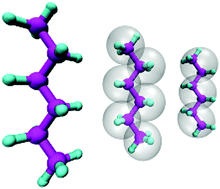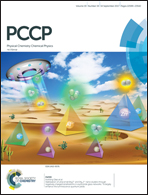Evaluation of mapping schemes for systematic coarse graining of higher alkanes†
Abstract
A model is introduced to explore the influence of different coarse-grained (CG) resolutions on the structural and thermodynamic properties of higher alkanes. Four different mapping schemes are considered, for which the potentials are derived using the conditional reversible work (CRW) method. The CRW method is a bottom-up coarse-graining procedure, which derives effective pair potentials between nonbonded chemical groups defined by the mapping scheme from the underlying molecular interactions in a quick, inexpensive way. We consider the applicability of CRW for mapping sites including up to four heavy atoms and study the properties of n-dodecane and n-tetracosane in the liquid state. Both chemical and thermodynamic transferability are achieved for high resolution representations. However, the ability of the coarse-grained model to effectively describe the system deteriorates as the size of the mapping is increased and sampling issues arise. By looking at the configuration distributions of the dihedrals in the atomistic sampling runs (gas phase), it is shown that the gauche population is underrepresented. Here we address the problem and propose a viable solution to recover the agreement between atomistic and low resolution coarse-grained representation. All the CRW potentials presented in the paper are reported in tabulated and analytical form.



 Please wait while we load your content...
Please wait while we load your content...